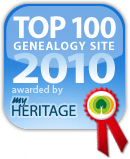Orvill S. Paller, Collection Management Specialist for Poland at the Family History Library in Salt Lake City, presented a lecture on Polish Genealogy & The Family History Library. His discussion included:
- Identifying & Prioritizing Records
- Acquisitions in Poland
- Records at the Family History Library (FHL)
- Family Search Indexing
- Records Search
The process of finding and obtaining new records for the collection of the FHL involves a process of identifying records, visiting the archives, prioritizing records, and collaborating with the archives.
Collection management at the FHL:
- Identifies and prioritizes records to be acquired, learning what types of records are available: church records, civil registration, census records, etc.
- Identifies the time periods and locations the records encompass
- Identify the archives that hold the records
Acquisitions in Poland began in May 1967 by the Genealogical Society of Utah (now referred to as FamilySearch). The content management specialist for Poland focuses exclusively on archives and repositories in Poland. The goal is the long term preservation of records through digital storage. Storage is in transition from microfilm to digital capture.
Current preservation efforts include records from Radom, Lublin, Czestochowa, and Opole. Only Opole records are being microfilmed. Records from the other areas are captured digitally. The initial focus has been on diocesan and archdiocesan archives.
Digital images are not yet available to the public.
Current negotiations are underway with both church archives and state archives in Poland for new acquisitions. As microfilmed records are converted to digital format in preparation for dissemination of those records via the Internet, existing contracts must be renegotiated. Earlier contracts did not include digital publication rights, and so all previous contracts must be renegotiated to enable the FHL to publish microfilmed records to the Internet.
Microfilmed records are maintained on master copies held at the Granite Mountain Records Vault near Salt Lake City. Over 2.7 million rolls of microfilm are currently housed at the Granite Mountain Records Vault. Copies of most of these films may be rented through local Family History Centers throughout the world, but a small part of the collection cannot be circulated outside of the FHL due to stipulations in the contracts with the owners of the original records.
Preparation is important when searching for records in the collection of the FHL:
- Who is the immigrant ancestor?
- In what Polish village was he or she born?
- Where is this village located?
- What religion did the ancestor practice?
- Where is the parish for this village?
FHL catalog entries use specific gazetteers. A single village may be listed under more than one name, in more than one country, due to the changing borders of Poland. In Poland, villages are named according to the Spis. In Germany, places are named according to Meyer’s Ort. When conducting a place search in the FHL catalog, diacritical marks are not needed.
If the film notes for a particular microfilm states VAULT, the microfilm is not physically located at the FHL, but may be ordered in advance, before a visit to the FHL. Otherwise, the staff requires between one and three days to transfer VAULT films from the Granite Mountain Records Vault to the FHL.
When searching the FHL Catalog, be aware that errors may exist. One may obtain different results depending on how the catalog is searched. For example, a village that is currently in Poland but was previously in Germany may display two record sets under the listing for one country, but only one record set in the other country.
The current effort to bring microfilmed records to the Internet is enlisting volunteers to index the records. http://www.familysearchindexing.org allows volunteers to download free indexing software and then index the records of their choice. Two current indexing efforts are the 1900 US Census and the 1871 Census of Canada. The FHL currently has 30,000 volunteer indexers at work and hopes to enlist the efforts of 100,000 indexers by the end of the year.
Eventually the FHL intends to revamp the FamilySearch website and deliver images through that portal.
Copyright © 2007 by Stephen J. Danko




Hello Stephen Danko:
RE; German Colonists Records of Poland
Would you happen to know or find any records about the German colonists who colonized the area of the Opole region around the 1790’s. My gr.gr.gr.grandfather settled the Grosse Dobern area. His name was Daniel Mehl and was well known in that area. We do not know where he came from . Would there be any reords in Poland and/or in Germany. Please advise.
Thanks,
Regards,
William F. Smith
buffalobillsmith2@yahoo.com